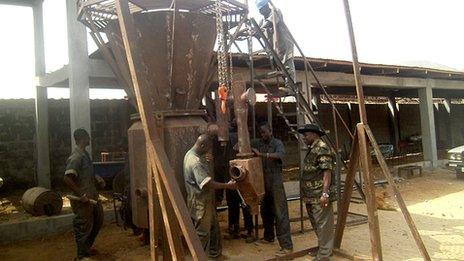Turning old cars into condom machines in Sierra Leone
- Published

Foday Melvin Kamara wants to extend his business to every district of Sierra Leone
Sierra Leone's Foday Melvin Kamara trained as an automobile engineer but, instead of manufacturing vehicles, he specialises in turning old car parts into agro-processing equipment and condom machines.
He started his business in 1997 with an investment of less than $100 (£63) which he had saved while he was in Germany as a student.
He told the BBC's African Dream series that he used part of that money to rent a house and the rest to buy steel products which were transformed into shovels and door hinges.
"Then we sold that and we ploughed a profit into the business," he said. That initial profit was used to acquire scrap materials.
"Indeed, we are able to convert waste to wealth," Mr Kamara pointed out.
According to him, his company, Fomel Industry and National Industrialisation Centre (Finic), is now worth around $1m.
The firm is based in Freetown, Sierra Leone's capital, and manufactures rice milling machines, palm nut crackers, palm oil processing plants, fruit juice making equipment and, as a sideline, condom dispensers.
Import dependency
Mr Kamara told the BBC's Lansana Fofana that his inspiration stemmed out of his passion for mechanical things.
He added proudly that he is contributing to the reduction of Sierra Leone's import dependency.
The country's infrastructure and economy have been improving considerably since it emerged from a decade of civil war in 2002.
"Before now we had difficulties with energy but now we have almost 100% availability of energy, and that is a very strong motivating factor," the entrepreneur said.
Mr Kamara explained that although his company still has to import some things which cannot be produced locally - like the engines needed to power equipments - it is building the biggest agricultural machinery centre in the country.
His long-term vision is to extend his business to every district of Sierra Leone and to venture into the renewable sector.
"We want to do biomass gasification which we can utilise in the production of electricity for rural electrification," he said.
'One condom at a time'
Mr Kamara told BBC Africa that the idea of producing condom vending machines actually came from the United Nations Population Fund.
"They contacted us and then we did a design which can dispense one condom at a time, and then when they saw that, they were so much amused that they asked us to do one that can dispense packets.
"Now we're producing machines that can dispense one packet at a time after the insertion of a 200 leones coin ($0.05, £0.03)," he said.
These machines will be placed in entertainment centres, guest houses, hotels and probably outside pharmacies.
"To bring the business to this level, many factors contribute but a very important one is for one to be tenacious," Mr Kamara said.
"Tenacity is very important and also passion is very important. If you have the passion and you have the tenacity, a lot of things you can make happen."
To make your entrepreneurial dreams come true you also have to be a good employer, he suggested.
"One challenge is actually the problem of getting people to do what you want and then getting people to accept change readily but a way to circumvent it, a way to reduce those challenges is to make the people feel important," he said.
"I think it's an area that every person aspiring to be in business should know, and no matter how good your ideas are, always remember to table them for discussion to those who work with you.
"Otherwise they will see themselves as being excluded in the process and therefore they will find it very difficult to be motivated to do the work."
African Dream is broadcast on the BBC Network Africa programme every Monday morning.
Every week, one successful business man or woman will explain how they started off and what others could learn from them.